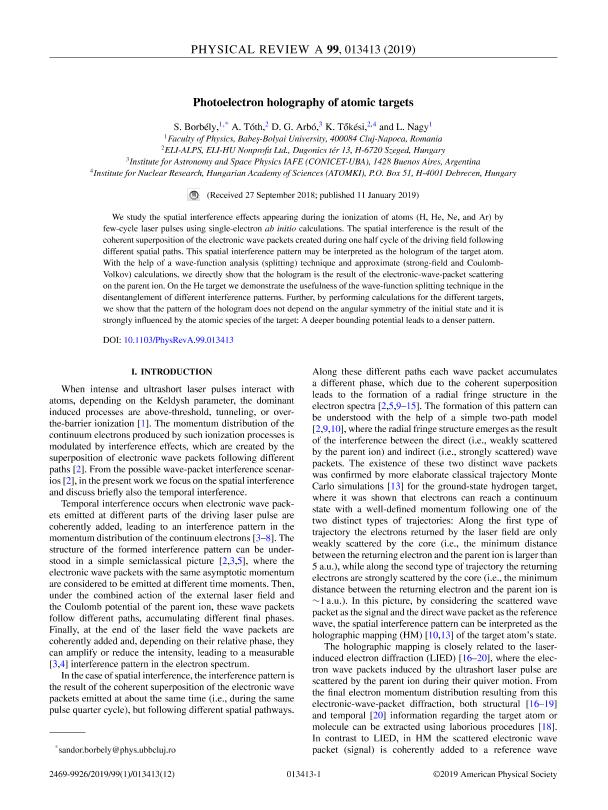Mostrar el registro sencillo del ítem
dc.contributor.author
Borbély, S.
dc.contributor.author
Tóth, A.
dc.contributor.author
Arbo, Diego

dc.contributor.author
Tokési, K.
dc.contributor.author
Nagy, L.
dc.date.available
2020-03-11T15:15:54Z
dc.date.issued
2019-01
dc.identifier.citation
Borbély, S.; Tóth, A.; Arbo, Diego; Tokési, K.; Nagy, L.; Photoelectron holography of atomic targets; American Physical Society; Physical Review A: Atomic, Molecular and Optical Physics; 99; 1; 1-2019; 1-12
dc.identifier.issn
2469-9934
dc.identifier.uri
http://hdl.handle.net/11336/99118
dc.description.abstract
We study the spatial interference effects appearing during the ionization of atoms (H, He, Ne, and Ar) by few-cycle laser pulses using single-electron ab initio calculations. The spatial interference is the result of the coherent superposition of the electronic wave packets created during one half cycle of the driving field following different spatial paths. This spatial interference pattern may be interpreted as the hologram of the target atom. With the help of a wave-function analysis (splitting) technique and approximate (strong-field and Coulomb-Volkov) calculations, we directly show that the hologram is the result of the electronic-wave-packet scattering on the parent ion. On the He target we demonstrate the usefulness of the wave-function splitting technique in the disentanglement of different interference patterns. Further, by performing calculations for the different targets, we show that the pattern of the hologram does not depend on the angular symmetry of the initial state and it is strongly influenced by the atomic species of the target: A deeper bounding potential leads to a denser pattern.
dc.format
application/pdf
dc.language.iso
eng
dc.publisher
American Physical Society

dc.rights
info:eu-repo/semantics/openAccess
dc.rights.uri
https://creativecommons.org/licenses/by-nc-sa/2.5/ar/
dc.subject
PHOTOELECTRON
dc.subject
HOLOGRAPHY
dc.subject
LASER
dc.subject.classification
Física Atómica, Molecular y Química

dc.subject.classification
Ciencias Físicas

dc.subject.classification
CIENCIAS NATURALES Y EXACTAS

dc.title
Photoelectron holography of atomic targets
dc.type
info:eu-repo/semantics/article
dc.type
info:ar-repo/semantics/artículo
dc.type
info:eu-repo/semantics/publishedVersion
dc.date.updated
2019-12-18T13:55:47Z
dc.journal.volume
99
dc.journal.number
1
dc.journal.pagination
1-12
dc.journal.pais
Estados Unidos

dc.journal.ciudad
Nueva York
dc.description.fil
Fil: Borbély, S.. Babes Bolyai University; Rumania
dc.description.fil
Fil: Tóth, A.. ELI-HU Nonprofit Ltd; Hungría
dc.description.fil
Fil: Arbo, Diego. Consejo Nacional de Investigaciónes Científicas y Técnicas. Oficina de Coordinación Administrativa Ciudad Universitaria. Instituto de Astronomía y Física del Espacio. - Universidad de Buenos Aires. Facultad de Ciencias Exactas y Naturales. Instituto de Astronomía y Física del Espacio; Argentina
dc.description.fil
Fil: Tokési, K.. ELI-HU Nonprofit Ltd; Hungría. Hungarian Academy of Sciences. Institute for Nuclear Research; Hungría
dc.description.fil
Fil: Nagy, L.. Babes-bolyai University; Rumania
dc.journal.title
Physical Review A: Atomic, Molecular and Optical Physics

dc.relation.alternativeid
info:eu-repo/semantics/altIdentifier/url/https://link.aps.org/doi/10.1103/PhysRevA.99.013413
dc.relation.alternativeid
info:eu-repo/semantics/altIdentifier/doi/http://dx.doi.org/10.1103/PhysRevA.99.013413
Archivos asociados
